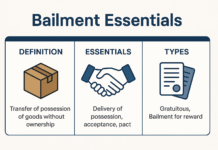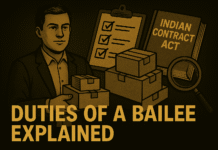Explain when a surety is discharged or not discharged from his liability ? Or Under what circumstances is a surety discharged?
Ans. Discharge of surety- A surety will be discharged from his liability to the creditor under the following circumstances:- where a surety is responsible for the performance of several and distinct contracts of duties, a change in one of those contracts or duties will not affect the surety’s liability as to the rest. If the alteration is in favour of and to the benefit of surety he cannot avoid it. (Anirtuldin v. Thomee’s Bank Ltd., AIR 1963 S. C. 749).
2. Discharge by contract with the principal debtor.—Where a creditor enters into a contract with the principal debtor and contract has the effect of discharging the principal debtor, the surety is also discharged (Section 139 Indian Contract Act), The suspension of debt and stipulation that the period of limitation will not during the period of suspension, will have no effect on the liability of the guarantor. (Gopal v. Trade Industries, AIR 1978 Mad. 134).
3. Discharge where a creditor does not act or makes any omission.— Where a creditor does not act or makes any omission the legal consequence of which is the discharge of the principal debtor, the surety is also discharged. (Section 134). A surety is not discharged when the creditor allows the execution of his decree against the principal debtor to be barred by limitation—/Shah Ahmed v. Sher Ali and others, 1965 A. L. J. 629 (F. B), after overruling many cases are upholding the English case Carter v. White] ,
4. Compounding with the principal debtor.—When a creditor compounds with or gives time to, or agrees not to sue the principal debtor, the surety is discharged unless the surety assent to such contract (Section 135 Indian Contract Act). But if the contract to give time is not made with the principal. (Section 136 Indian Contract Act). Illustration C, the holder of an overdue bill of exchange drawn by A as surety for B, and accepted by B, contracts with M to give time to B. A is not discharged.
5. An agreement not to sue the principal debtor.— Under Section 135 of Indian Contract Act an agreement not to sue the principal debtor has. the effect of discharging the surety ; but mere forbearance on the part of the creditor to sue the principal debtor or enforce any other remedy against him does not discharge the surety unless there is anything to the contrary in the suretyship agreement. Illustration B owes to C a debt guaranteed by A. The debt becomes payable. C does not pay B for a year after debt has become payable. A is not discharged from the suretyship.
6. Release by creditor of one of co-sureties.—A release by the creditor of one of the co-sureties does not discharge the others neither does it free the surety so released from his responsibility to the other sureties, (Section 138 Indian Contract Act). In this connection English Law is different than that of Indian Law. English Law makes a difference between co-sureties bound jointly & co-sureties bound severally. The release of .a surety results in the release of co-sureties but in the case of co-sureties bound severally such release will not release the other co-sureties. Contrary to it in India in no condition the release of co-surety results in to release of others.
7. Effect of creditor doing anything inconsistent with the rights of surety.—Where the creditor does anything which is inconsistent with the rights of the surety and the eventual remedy of the surety nimseif against the principal debtor is thereby impaired, the surety is discharged (Section 139, Indian Contract Act).
8. Omission to do any act by the creditor.—Where the creditor omits to do any act which his duty is to the surety require him to do, and the eventual remedy of the surety himself against the principal debtor is thereby impaired the surety is discharged. (Section 139, Indian Contract Act). Illustration A puts M as apprentice to B, and gives a guarantee to B for M:s. fidelity. B promises on his part that he will at least once a month see M make up the case. B omits to see this done, as promised, and Membezzles. A is not liable to B on his guarantee.









![Maneka Gandhi v. Union of India [1978] 2 SCR 621: A Watershed Moment in Indian Constitutional Jurisprudence](https://www.infipark.com/articles/wp-content/uploads/2026/02/Image-Feb-18-2026-10_47_59-AM-218x150.jpg)








